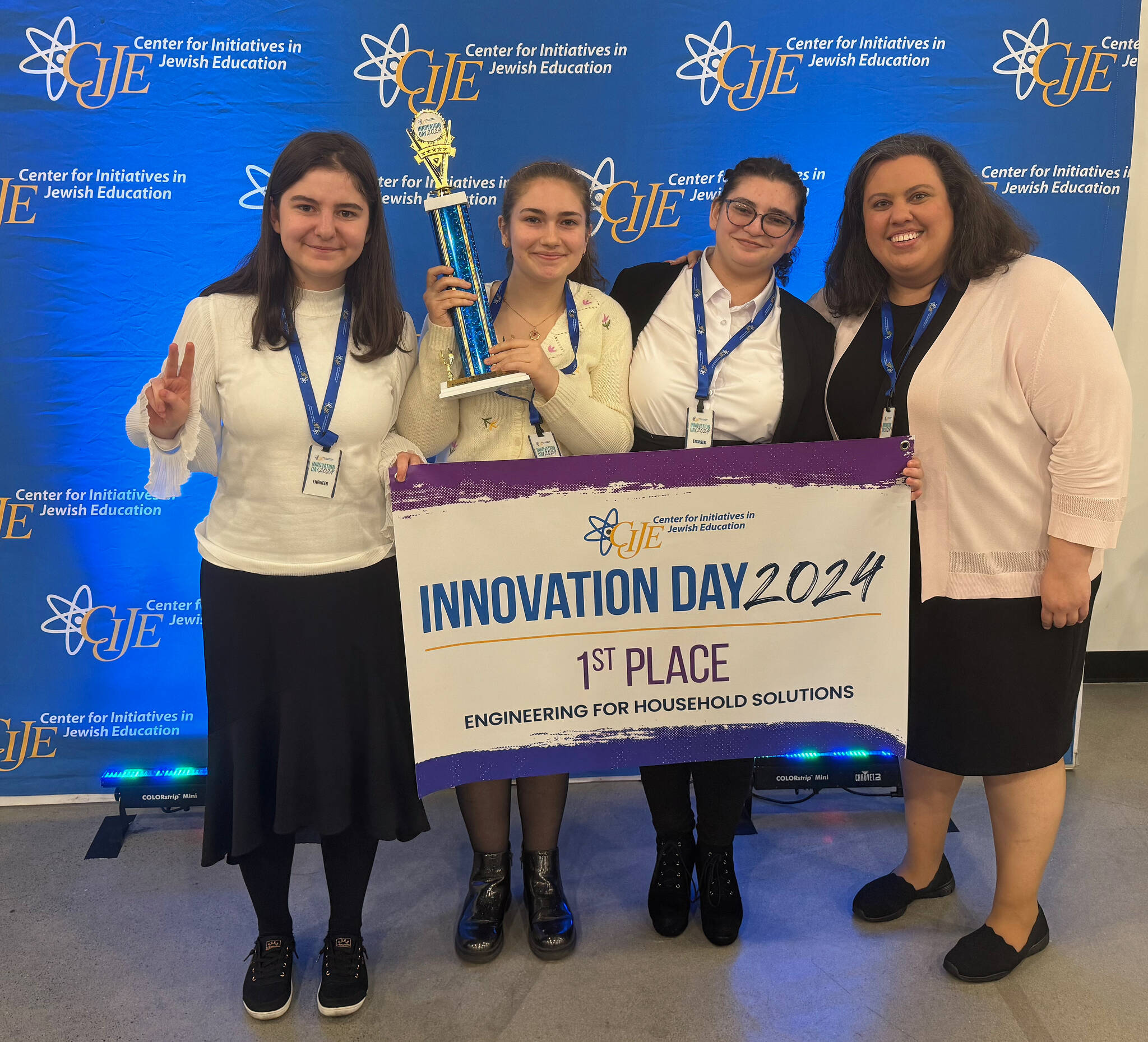With passion and diligence cemented at the forefront of their projects, a pair of Northwest Yeshiva High School sophomore STEM teams journeyed from Mercer Island to New Jersey to compete against squads from across the nation.
On May 22, the locals displayed their vast talent at the Center for Initiatives in Jewish Education (CIJE) Innovation Day 2024 event at the American Dream mall. About 1,700 students brought forth more than 500 STEM projects that were judged in eight categories.
The local girls team of Avital Aronov, Elizabeth Gabbay and Penina Rubin notched first place in the engineering for household solutions category with its SourBro Starter monitor that features, in part, an app that measures temperature, humidity, rise, acidity and Co2 when baking sourdough bread.
“They wanted to take some of the mystery out of sourdough starters,” said a proud Northwest Yeshiva STEM director Ariela DeFunis, who added that teams were required to utilize a micro-controller and combine it with an actuator and a sensor to devise their projects. Other elements of the competition were developing a pitch and a website and then presenting the projects in front of the judges.
Gabbay said her team had to deal with some trials and tribulations during its SourBro Starter journey. With the girls’ wireless device flashing fatal error messages the week of the competition, DeFunis said they needed to engage in some extensive troubleshooting to get the SourBro back on track.
“We definitely worked very hard together and we enjoyed working together. Coming out with a victory was fulfilling because it felt like even if the project wasn’t exactly the way we expected it, the judges still recognized our hard work and the complexity of our project,” Gabbay said.
Nothing was going to halt the teams from bringing their projects to fruition, DeFunis said. The dedicated STEMers worked on Sundays and until 10 p.m. the night before departing for the competition. When they arrived in New Jersey, they kept their eyes open and laser-focused in the hotel lobby until 2:30 a.m. to ensure that everything was clicking so the projects would be in top form later that day.
“They’re just a great group of kids in general. They’re just motivated, hard working and do whatever it takes to get things done. Full of grit. They’re just amazing,” said DeFunis, who has directed the school’s STEM program since its inception in 2017.
DeFunis added that the students’ involvement with their projects — from construction to presentation — mirrors life situations in which positivity and determination come heavily into play.
“For me, when I see kids working that hard, it just makes me want to give so much more of myself,” said DeFunis, adding that seeing her students garner success after coming face to face with real-life pressure and responsibility is what makes teaching joyful.
On the boys’ side, Northwest Yeshiva’s Charlie Feuer and Steven Rolan also competed in the household solutions category with an app-controlled automated blinds system that featured a device attached to the twisting wand. The blinds could fully open or close or be placed in a medium position, and DeFunis added that users can detach the device in order to use their existing blinds on the sabbath.
While creating their blinds system, the duo had to scrap its initial clap-on, clap-off plan because of sensor affordability and later had to redesign its 3D model and change its code and corresponding website. DeFunis said they stood up to the challenges and never gave up along the way.
“We ended up getting everything done in, I think, a pretty reasonable time table and it was fulfilling to be able to go there and present it to judges,” Feuer said. “Standing in front of the judges, everything worked fine and the presentation went well, I think.”
Since the Northwest Yeshiva STEM program’s formation, the school has entered several competitions and last year a local team won an overall first prize at a CIJE competition in Chicago.
“Learn from the past, study the present, transform the future,” reads the Brooklyn, New York-based nonprofit organization’s website.
Gabbay said it was initially a bit stressful to attend the competition because of their project challenges, but that all faded away.
“I think in competition, we were mostly just excited to see all of the other projects and to have the experience of interacting with other people who were on the same journey as we were — making little STEM projects throughout the year,” she said.


